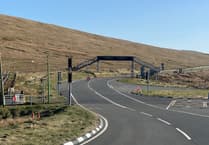A major projects unit should be created to manage capital schemes.
That’s one of the findings in the Beamans report on the Department of Infrastructure.
The independent review, commissioned by the government, comes at a time when the department is being criticised over a number of issues, including delays and design of the Douglas promenade redevelopment.
Beamans says the DoI needs more project managers and ’urgent action’ should be taken to overhaul the entire structure of the department.
Infrastructure Minister Tim Baker has described the report as a blueprint for the future and says its ’important recommendations’ will help the department deliver crucial services.
Presently, the DoI employs five project managers.
A further seven are required to support the capital programme, says Beamans. It says the budget allocation for 2021/22 exceeds the DoI’s delivery capability and the department needs to prioritise its projects.
The report continues: ’The department also needs to assess how, or make clear to what extent, they can best obtain resources from the private sector, eg. through framework agreements, to fill that gap.
’Given supply chain limitations, a workforce plan with a stronger focus and emphasis on development, talent management and recruitment needs to be put in place as a matter of urgency.’
The report highlights what it describes as ’fundamental weaknesses’ in a department with a wide remit that is lacking in strategic orientation and focus.
Beamans says: ’This is not a criticism. It is a natural by-product of creating a departmental framework to manage a group of service providers with the chief executive ultimately accountable for the delivery of those services.
’In our view, this is an impossible management remit for any single individual to fulfil without an effective means of delegating responsibility to each individual service provider.’
Beamans says that under the present regime the chief executive carries an onerous burden, stating: ’A natural consequence of this organisational structure is to place accountability for the performance of each functional element of service provision and delivery on the chief executive. In short, the buck ultimately stops with the chief executive for all elements of departmental service delivery â?¦ This is an impossible management remit to fulfill given the breadth of those service delivery functions and associated requirements.’
Beamans says service delivery should be the responsibility of individual directors, while the chief executive should be developing policy, strategy and management of the political interface.
Dealing with the view that the DoI is simply ’too big’ and should be broken up, Beamans states: ’We do not share the view that the only option is to break up the department. In our view, it is not the size of the department that is the issue. It is the management, organisational and governance framework that has been put in place to manage what are large, diverse elements of service provision.’
For a public facing department, failing to communicate is not an option, says the report.
’Telling people clearly what you are doing, when you will do it, when decisions will be taken, and how they will know what they are, are all important,’ states Beamans. ’And if you don’t know these things, then letting people know this too, to avoid a risk that people think things are happening but are shrouded in secrecy or that they are being excluded, is essential.’
Communication that is ’prompt, regular, honest and consistent’ is essential.
The report adds: ’To be frank, everyone we spoke to during the course of the review, including members of the senior management team, acknowledged that communication and engagement was an area where there was significant room for improvement.’
The suggested shake-up includes:
A new role of chief operating officer (COO) to act as portfolio director for all capital projects.
A new management board, chaired by the chief executive or political head that includes senior representatives of stakeholders to whom services are provided. The board would hold the COO and service providers to account for service delivery.
Additional project managers to support the capital programme.
A people strategy that prioritises supporting staff to develop the skills and capabilities they need.
A skills matrix for all operational teams that details the skills required, highlight gaps, and can be used for triggering activity to close those gaps, such as recruitment, training or coaching.
Better communication and engagement with the public.
DoI under fire
£25million Douglas promenade - beset by false starts and design U-turns, this project finally got under way in September 2018 and passed its latest scheduled finish date three months ago.
Richmond Hill - this 2010 £3million road reconstruction project ran over budget and has led to years of disruption for motorists.
Ballakillowey, Rushen - a giant roundabout installed here in 2011 led to questions in Tynwald over its costs and size and whether it was needed at all given there was no history of reported road accidents.
Liverpool landing stage - the £38million Manx taxpayer-funded project was lambasted by Steam Packet chairman Lars Ugland who said costs had soared because of poor design by an American engineering firm.
Peel marina - since construction in 2009, there have been continuing issues with silt build up and toxic materials contamination.


-(1).jpeg?width=209&height=140&crop=209:145,smart&quality=75)
.jpeg?width=209&height=140&crop=209:145,smart&quality=75)

Comments
This article has no comments yet. Be the first to leave a comment.